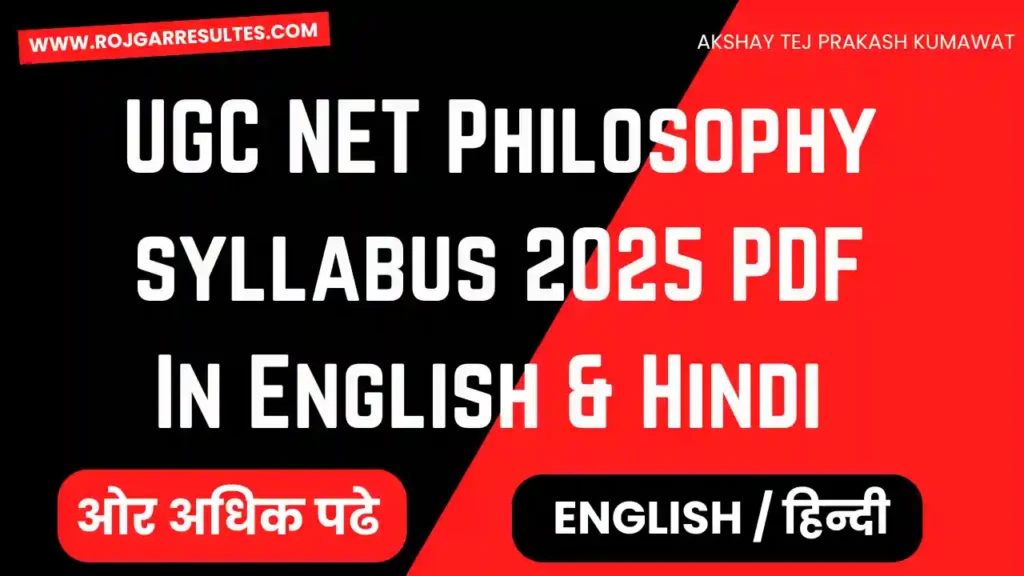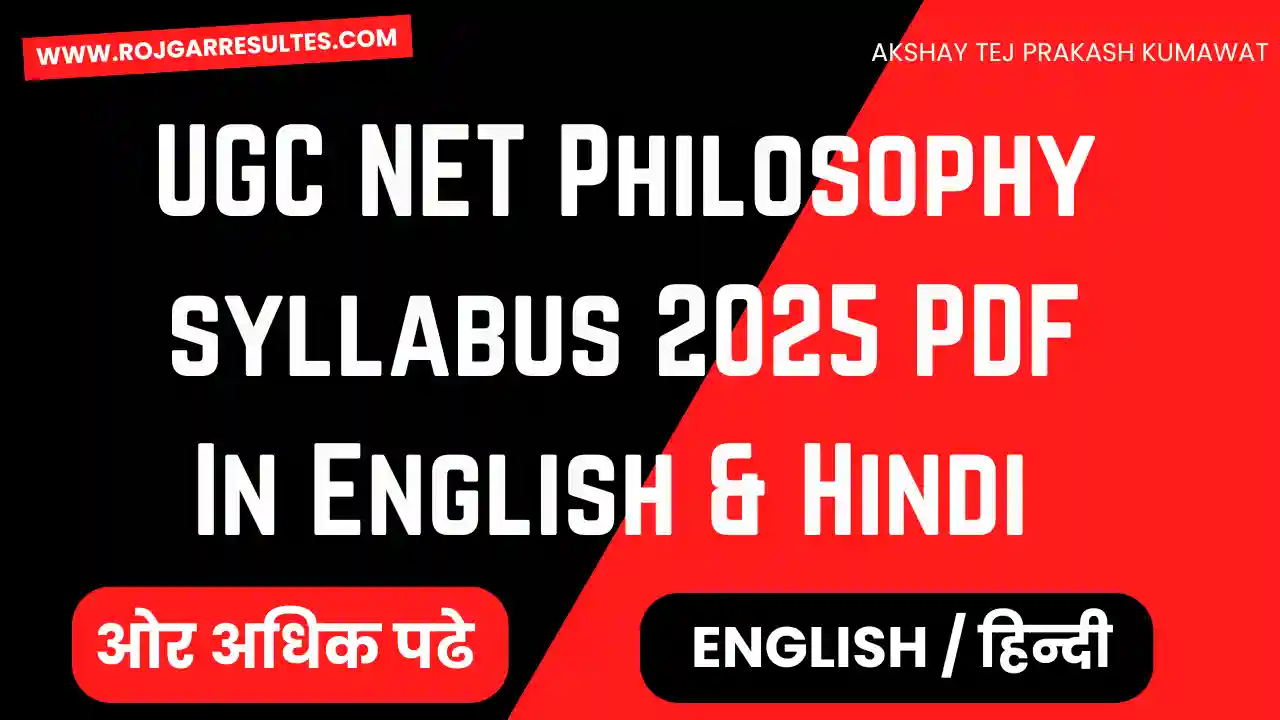UGC NET Philosophy syllabus 2025 is crucial for aspirants aiming to become Assistant Professors or earn the JRF in Philosophy. In this post, we will present the full syllabus (Paper I & Paper II), features, downloads (PDF, Hindi), and a preparation roadmap. Read on to cover every aspect.
सभी अभ्यर्थियों को सूचित किया जाता है कि रिजल्ट, सिलेबस, आवेदन लिंक, एडमिट कार्ड व नोटिफिकेशन के सभी लिंक नीचे उपलब्ध हैं।
UGC NET Philosophy syllabus 2025 Notification
UGC NET Philosophy syllabus 2025 is designed to help aspirants understand every concept required for success in the exam. Candidates preparing for Paper I and Paper II should first review the complete ugc net philosophy syllabus pdf to plan their studies systematically.
Whether you study in English or prefer the ugc net philosophy syllabus in hindi, both versions are available officially for easy reference. The ugc net philosophy syllabus paper 1 focuses on teaching and research aptitude, while Paper II emphasizes philosophy-specific topics like Indian and Western thought, ethics, logic, and applied philosophy.
UGC NET Philosophy syllabus 2025 Latest Update
Students can easily get the ugc net philosophy syllabus pdf download option from trusted education portals or the official UGC website. With proper understanding of the ugc net philosophy syllabus 2025 pdf, aspirants can create a clear preparation strategy and boost their performance in the upcoming exam.
1. Exam Structure & Pattern: Paper 1 + Paper 2
| Paper | No. of Questions | Marks | Duration | Negative Marking? | Scope |
|---|---|---|---|---|---|
| Paper I | 50 (compulsory) | 100 | 3 hours | No | General: Teaching & Research Aptitude, Reasoning, ICT, etc. |
| Paper II | 100 (compulsory) | 200 | 3 hours (together with Paper I) | No | Philosophy subject-wise syllabus |
- Each correct answer carries 2 marks; there is no negative marking.
- Total marks = 300 (Paper I + II)
- Paper I is common for all subjects; Paper II is subject-specific for Philosophy. ugcnetonline.in
2. Paper I: General Paper (Teaching & Research Aptitude)
- Teaching Aptitude
- Research Aptitude
- Reading Comprehension
- Communication
- Reasoning (Logical & Mathematical)
- Higher Education System
- Data Interpretation
- Information & Communication Technology (ICT)
- People & Environment
This Paper’s syllabus is the same for all UGC NET aspirants.
You should allocate time in your study plan for Paper I too — many aspirants neglect it, which costs marks.
3. Paper II: Philosophy – Full Syllabus (10 Units)
Below is the detailed syllabus for UGC NET Philosophy Paper II.
1: Classical Indian — Epistemology & Metaphysics
- Vedic & Upaniṣadic: Ṛta (cosmic order), yajñā, origins, Ātman / Self, Jāgrat, Svapna, Susupti, Turiya, Brahman
- Cārvāka: Pratyakṣa (perception) as sole pramāṇa; critique of anumāna, śabda; consciousness as epiphenomenon
- Jainism: Reality (sat, dravya, guṇa, paryāya), Jīva & ajīva, anekāntavāda, syādvāda, nayavāda, theory of knowledge
- Buddhism: Four Noble Truths, Āstangika Mārga, pratītyasamutpāda, kṣaṇabhāvavāda, anātman; schools — Vaibhāṣika, Sautrāntika, Yogācāra, Madhyamika, Tibetan
- Nyāya: Pramā/pramāṇa, pratyakṣa, anumāna, upamāna, śabda; Hetvabhāsa; concept of God; debate Buddhism vs Nyāya; anyathākhyāti
- Vaiśeṣika: Padārtha theory, kinds, asatkāryavāda, types of kāraṇa (samavāyī, asamavāyī, nimitta), paramaṇukaraṇa
- Sāṃkhya & Yoga: Satkāryavāda, prakṛti & evolutes, Purusha plurality; arguments for prakṛti; Patañjali’s theory of pramāṇa; citta, vṛtti, citta-vṛtti; stages of citta-bhūmi; role of God
- Purva-Mīmāṃsā: Pramāṇyavāda (svataḥ / parataḥ), Śruti, classification of śruti-vākyas, vidhi/niṣedha/arthavāda, dharma, śabda-nityavāda, Jāti, śaktivāda; Kumārila vs Prabhākara; triputi, abhāva, anupalabdhi; theories of error: akhyāti, viparīta-akhyāti; anvitābhidhāna, abhihitanvaya
- Vedānta:
- Advaita: relation of Brahman & Ātman, grades of sattā, adhyāsa, māyā, jīva, vivartavāda, anirvacanīya-khyāti
- Viśiṣṭādvaita: saguṇa Brahman, refutation of māyā, pariṇāmavāda, jīva, bhakti & prapatti
- Dvaita: rejection of nirguṇa Brahman, bheda, sāksi, bhakti
- Dvaitādvaita, Śuddhādvaita
2: Classical Western — Ancient, Medieval & Modern (Epistemology & Metaphysics)
- Pre-Socratic philosophers: Thales, Anaximander, Anaximenes, Ionians, Pythagoras, Parmenides, Heraclitus, Democritus
- Sophists, Socrates
- Plato: knowledge vs opinion, theory of Ideas, dialectic, soul, God
- Aristotle: classification of sciences, logic as organon, critique of Plato, causation, form & matter, potentiality/actuality, soul & God
- Medieval: Augustine (problem of evil), Anselm (ontological argument), Thomas Aquinas (faith & reason, essence & existence, proofs of God)
- Modern: Descartes (method, doubt, cogito, dualism, proofs), Spinoza (substance, attributes, “God or Nature,” intellectual love, parallelism), Leibniz (monads, pre-established harmony, freedom), Locke (ideas, substance, knowledge), Berkeley (immaterialism, esse est percipi), Hume (impressions vs ideas, causality, skepticism, identity), Kant (judgments, synthetic a priori, categories, phenomenon/noumenon, metaphysical deduction, ideas of Reason), Hegel (dialectic, being, becoming, absolute idealism)
3: Indian Ethics
- Purusārtha, Śreyas–Preyas, varṇa-āśrama, Dharma, Ṛṇa, yajña, duty
- Karma-yoga, sthitaprajñā, svadharma, lokasaṃgraha
- Apūrva, a dṛṣṭa, sādhya-sacchana, itikartavyatā
- Ṛta, satya, yoga-kṣema
- Jainism: samvara, nirjarā, tri-ratna, pañca-vrata
- Buddhism: upāya-kaushala, brahmavihāra (maitrī, karuṇā, muditā, upekṣā), bodhisattva
- Cārvāka: hedonism
4: Western Ethics
- Good, right, justice, duty, obligation, cardinal virtues, eudaimonism
- Egoism, altruism, universalism
- Subjectivism, cultural relativism, supernaturalism
- Ethical realism vs intuitionism
- Kantian ethics: good will, categorical imperative, duty, means/ends, maxims
- Utilitarianism: principle of utility, sanction, act vs rule, Bentham, Mill, Sidgwick
- Theories of punishment
- Ethical cognitivism vs non-cognitivism: emotivism, prescriptivism, descriptivism
5: Contemporary Indian Philosophy
Thinkers & themes:
- Vivekananda: Practical Vedānta, universal religion
- Sri Aurobindo: evolution, integral yoga
- Muhammad Iqbal: self, God, intuition
- Tagore: religion of man, nationalism
- K. C. Bhattacharyya
- Radhakrishnan: intellect & intuition, Hindu view of life
- J. Krishnamurti: freedom from the known, analysis of self
- Gandhi: truth, non-violence, critiquing modern civilization
- Ambedkar: caste, Hinduism, Neo-Buddhism
- Deendayal Upadhyaya: Integral Humanism
6: Recent Western Philosophy
- Analytic & Continental Philosophy
- Frege: sense & reference
- Logical positivism: verification theory, elimination of metaphysics
- Moore: common sense, proof of external world
- Russell: logical atomism, definite descriptions
- Wittgenstein: picture theory, private language, meaning & use
- Gilbert Ryle: category mistake, critique of Cartesian dualism
- A. J. Ayer: verificationism, the problem of knowledge
- Quine: two dogmas of empiricism
- Grice, Strawson
- Phenomenology & Existentialism: Husserl, Heidegger, Kierkegaard, Sartre, Merleau-Ponty
- Pragmatism: William James, John Dewey
- Postmodernism: Nietzsche, Rorty
- Levinas: ethics as first philosophy
7: Social & Political Philosophy (Indian)
- Mahābhārata: Danda-nīti, Rajadharma, law & governance
- Kautilya: pillars of statecraft, sovereignty, law, welfare
- Kamandaki: social order
- Constitutional morality, secularism, fundamental rights
- Social institutions: family, marriage, property, education, religion
- Colonialism, swadeshi, social justice, affirmative action
8: Social & Political Philosophy (Western)
- Plato: ideal state, justice
- Hobbes, Locke, Rousseau: social contract
- Isaiah Berlin: liberty
- Bernard Williams: equality
- Liberalism: Rawls, Nozick, Dworkin; Amartya Sen (capabilities, global justice)
- Marxism: class, alienation, critique of capitalism
- Communitarianism: Taylor, MacIntyre, Michael Sandel
- Multiculturalism: politics of recognition, Kymlicka
- Feminism: basic concepts, liberal, socialist, radical, eco-feminism
Unit 9: Logic
- Truth & validity
- Denotation & connotation
- Nature of propositions
- Categorical syllogism, laws of thought, square of opposition
- Truth-functions & propositional logic
- Quantification & rules
- Symbolic logic, decision procedures (truth tables, Venn diagrams)
- Axiomatic systems: consistency, completeness
- Difference between deductive & inductive logic
Unit 10: Applied Philosophy
- What is applied philosophy?
- Philosophy of technology: dominance, power, inequalities
- Democratization of technology
- Ethics of information tech, bio-tech, non-tech
- Environmental ethics: Aldo Leopold, deep ecology, animal rights (Peter Singer)
- Medical ethics: surrogacy, abortion, euthanasia, female infanticide
- Professional ethics: corporate governance, responsibility
- Media ethics: privacy, representation, cyberspace
- Legal ethics: law & morality, authority & validity
- Philosophical counseling: everyday problems


